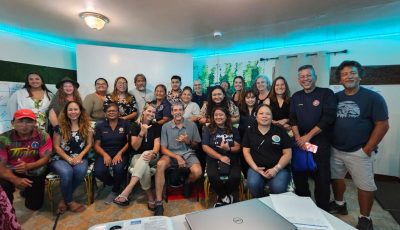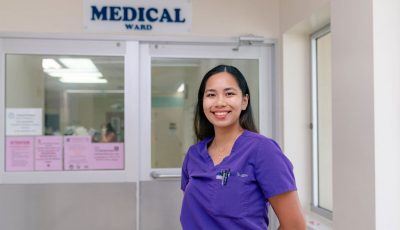CHCC observes World AIDS Day
In observance of World AIDS Day yesterday, Dec. 1, the Commonwealth Health Care Corp. HIV/STD Resource and Treatment Center encourages anyone who has had unprotected sex or shared needles for injection drug use to get tested.
Knowing your status is important, not only for yourself but for your sexual partners. An HIV test can take as little as 30 minutes to get results, and the sooner you know your status, the more control you have in prevention and treatment.
World AIDS Day is observed each year on Dec. 1, and is an opportunity for people worldwide to unite in the fight against HIV/AIDS, show their support for people living with HIV, and remember those who have passed away.
Started in 1988, World AIDS Day was the first ever global health day.
The theme for World AIDS Day 2019 is “Ending the HIV/AIDS Epidemic: Community by Community.” Since 1997, the CNMI has had less than 50 cases of HIV/AIDS. Although the numbers are low, it does exist.
Human immunodeficiency virus is a virus that attacks the immune system, our body’s natural defense against illnesses, which makes a person with HIV more vulnerable to other diseases and infections like pneumonia and tuberculosis. HIV can be passed from person to person through unprotected sex or sharing needles for drug use. Mothers with untreated HIV can give it to their babies during pregnancy and birth, and mothers who are HIV positive cannot breastfeed their children. Without medication, HIV can also lead to Acquired Immunodeficiency Syndrome. People are diagnosed with AIDS when their cell count, known as the CD4, drops below 200 cells/mm or when they develop certain illnesses such as pneumocystis pneumonia, certain types of cancer, and candidiasis, also known as thrush.
Today, many new treatments are improving the lives of people living with HIV/AIDS. Most patients take daily medication, usually in the form of pills, called antiretroviral therapy. The goal of ART is to get a person’s HIV down to an “undetectable viral load”—also called being virally suppressed. This means that the level of HIV in a person’s blood is very low and, according to the U.S. Department of Health and Human Services, “people with HIV who maintain an undetectable viral load have effectively no risk of transmitting HIV to their HIV-negative partner through sex.”
HIV is a lifelong diagnosis, but the disease is better understood than even just a few years ago and treatment is available. CHCC provides prevention and testing services, which aim to prevent infections before they occur and reduce the impact on people who are affected, in addition to treatment options. For more information on testing or an appointment with a medical provider, contact the HIV/STD Resource & Treatment Center at (670) 664-4050.
Condoms are also a crucial part of HIV and STD prevention. Using condoms correctly can significantly reduce your chances of passing STDs to your partner or partners, and are also effective at preventing pregnancy. The CHCC Family Planning Program offers condoms at no charge to all CNMI residents. Contact the Family Planning Program at (670) 234-8951 (choose the option for Family Planning) or (670) 664-8701 for more information, or pick up some free condoms at the CHCC Public Health Office (by the dental clinic), the Maternal and Child Health Bureau Office on the fourth floor of Marianas Business Plaza, the CHCC Outpatient Pharmacy, PHI Pharmacy in Dandan, the Rota Health Center and the Tinian Health Center.
For more information on World AIDS Day, visit: https://www.worldaidsday.org/.
For more information on HIV/AIDS, visit: https://www.cdc.gov/hiv/default.html.
For more information about CHCC programs, follow it on Facebook and Twitter at @cnmichcc, visit its website at www.chcc.gov.mp, or call (670) 234-8950. (PR)



























